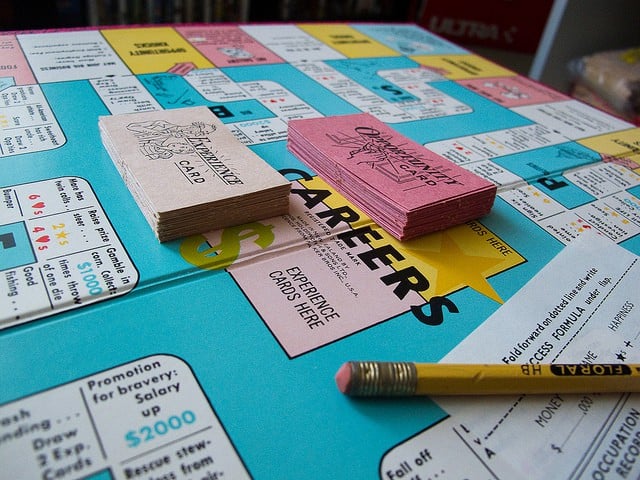Most school pupils have the chance to undertake a work experience placement, usually when they are in Year 10. It can be really exciting to enter the workplace for the first time, but also daunting if you know that you might have to find the placement yourself.
If you know already that you want to follow a maths based career, then you may wish to complete a work experience placement which is relevant to your career ambitions.
Here are some steps which might help you:
Step 1 – Find out about maths related careers
When you ask someone to name a career which uses maths, they might be able to name teacher, accountant, engineer and then run out of ideas. While these are all great careers, and ones which you may wish to consider, there are also hundreds of other careers which studying maths can lead to. Unfortunately many maths teachers and even school careers advisers don’t have time to find out about the huge number of maths based careers which are out there. This is why you should spend some time looking through the specialist career profile section of this website and also looking at the pages on companies which employ mathematicians. If you are particularly interested in engineering, then take a look at the Royal Academy of Engineering’s careers pages.
Step 2 – Find out about how your school allocates work experience placements
The easiest way for you to find a work experience placement is always going to be by using the structures and organisations which your school uses to find placements. If they don’t have a list of placements to choose from, then they might be able to give you contacts which you can follow up yourself. If however they suggest that you will need to find your own placement then you will need to put some more work in.

Step 3 – Finding your own maths focused work experience (if you need to, and your school allows it)
Here are five pieces of advice regarding finding your own work experience placement.
-
Look around your local area
Now that you have an idea of which maths related careers you are interested in, then have a look in your local area to see which companies use lots of maths, or contain teams of people who focus on using maths. If your school doesn’t have any existing contacts with the company, then you may need to e-mail them directly. Look on their website to find the contact details of a relevant person. Emailing a contact in Human Resources is usually a good place to start, as they will be able to pass on your email to somebody relevant. Remember that most companies have teams within them that use more maths in their daily work than others, for example your local biscuit factory will have a finance team, a team of production engineers or a team who are in R&D (Research and Development).
-
Use any personal contacts which you might have
It can sometimes be hard for a company to take on a work experience student who they don’t know, therefore if you have any personal or family contacts in an organisation, then make the most of these. Even if it is a friend of a friend of a friend, it could give you a better way in than contacting them from cold.
-
Be enthusiastic, but realistic about what you will be able to do
Let the company know that you are passionate about maths, which is why you are interested in their sector, but also give the message that you are willing to be helpful in any way possible. You might not yet have the mathematical skills or professional training to help with their more complex work, but you will be happy and able to do any filing, photocopying, phone answering or other tasks which they might need.
For example if you spent your placement in a firm of actuaries, you won’t be able to do the professional work of an actuary, however you would be working alongside people who use maths on a daily basis and would be able to pick up on career tips and gain a sense of whether it is a career which you would like to follow. In some cases you may also be lucky and get a company where they can give you a task which is more mathematically focused, depending on the work which they do.
-
Get your contact letters/emails checked before you send
It might sound obvious, but get someone older to double check any e-mails which you send to companies or organisations. It will look better if you send them yourself, however having had a second pair of eyes look over them can avoid mistakes and make you look more mature and professional. Also make sure you have a sensible e-mail address involving your name rather than something silly such as [email protected]
-
Don’t worry if a maths based placement is hard to find when you are at school
When you are still at school, work experience is often as much about gaining transferable skills as it is about finding out about a particular career. Your work experience placement will help you learn about skills such as punctuality, being smartly dressed, interacting with work colleagues or using a computer in the workplace. This means that if you find work in an office you will still be gaining valuable experience, even if your experience is not entirely maths focused.
But won’t I need maths focused work experience in order to get into university to study maths?
Unlike applying to study medicine, which often requires career specific work experience in a hospital, maths degrees don’t usually require you to have undertaken maths focused work experience. Most mathematics admissions tutors will look firstly at your academic grades and then secondly at the other experiences which you have.
It is however important that you do try your best to get as much maths related experience as you can. It could however take many forms: including reading popular mathematics books; helping at a homework club for Year 7; or taking part in mathematics competitions. Anything which demonstrates your passion for your subject will be helpful. Therefore if your work experience is not particularly mathematically focused at this stage, it shouldn’t be a hindrance to you in applying to university to study maths, as you can show your passion in other ways. Working in a shop, café or even hairdressers can still show that you are organised, reliable and hardworking.
Once you are at university you should then try to undertake much more focused work experience such as summer internships or industrial placements. Read this guide to work experience for university maths students. By this stage you will have learnt more mathematics and be able to do more meaningful mathematical work within a company.
Article by Hazel Lewis
Photo credits:
Featured image – Careers board game by huppypie@Flickr CC BY-NC-ND 2.0
Careers by Sandburchick@flickr CC BY-NC 2.0
Beyond Generation Hack by kris krüg@flickr CC BY-NC-ND 2.0







